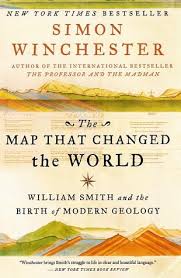William Smith and the Principle of Faunal Succession

Medieval rationalists believed in the constancy of the natural order; that the natural order governs in more-or-less the same way at all times and in all places. They believed this as part of the Aristotelian philosophical framework, which has since been abandoned. This was modified by the Biblical belief, shared by Jews and Christians alike, that Creation and the Deluge caused radical upheavals in the natural world.
In modern times, rationalists also believe in the constancy of the natural order, but for a different reason: Because it has been empirically demonstrated. William Smith is the subject of a terrific new book, The Map That Changed the World: William Smith and the Birth of Modern Geology, and he discovered the Principle of Faunal Succession (oddly, the book does not mention the principle by this name). Like other creationists of his day and today, Smith originally believed that making sense of ancient history was impossible; Creation and the Deluge were assumed to have played havoc with nature and even the laws of nature themselves. But in the course of his surveying work to find coal, it dawned on Smith that there was a very precise order to be found in geological strata across the country. This made him an extremely successful surveyor, but more importantly, it made the science of geology possible.


